The war in Gaza has starkly exposed deep EU divisions - and impotence - when it comes to influencing the worst conflicts in the Middle East.
Yet, the US and the Arab states will expect Europe to help pay for the mess left by the war. "We are payers, not players," mused one EU diplomat.
The initial response from Brussels has been one of cautious welcome to the news of the ceasefire.
However, if it holds, member states will undoubtedly grasp the chance to put an extremely painful episode behind them, and - when it comes to a longer-term peace - to try to somehow shape outcomes.
Describing the past 15 months as an "unjustifiable ordeal", French president Emmanuel Macron said: "A political solution must come."
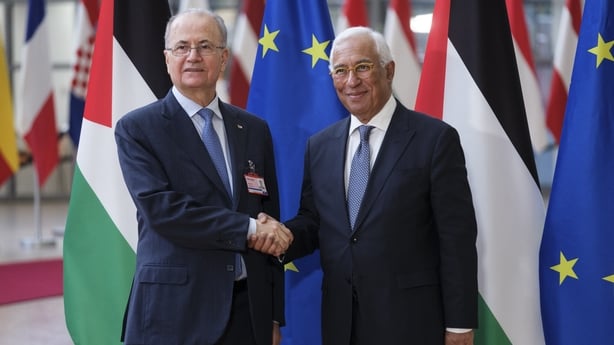
The Palestinian prime minister Mohamed Mustafa is in Brussels today to meet the new President of the European Council António Costa and tomorrow he will meet the EU's new foreign policy chief Kaja Kallas.
"We are already taking forward a multi-year support programme for the Palestinian Authority, to help pave the way for a two-state solution," the EU’s commissioner for the Mediterranean Dubravka Šuica told Politico.
"We will work on a dedicated reconstruction plan and recovery process for Gaza with international partners, including the Gulf countries."
None of this hides the reputational damage the war in Gaza has inflicted on the EU.
Deeply divided
National capitals were deeply divided between those supporting the Palestinians and those supporting Israel, with a cohort in the middle, while there were divisions within the EU institutions themselves.
Ursula von der Leyen, president of the European Commission, has been the target of sometimes vicious abuse (especially in Ireland) for the perception that she offered unqualified support to Israel that somehow enabled its devastating response.
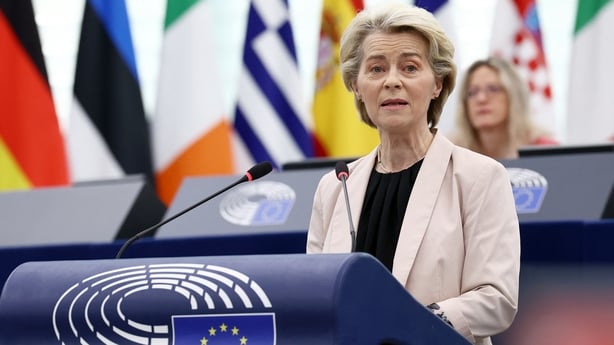
Her officials counter that she made her initial remarks just minutes after witnessing first-hand the charred remains of children in an Israeli Kibbutz after the Hamas-led 7 October attacks and that she subsequently fully supported calls for a ceasefire and for humanitarian assistance to be rushed into Gaza.
In reality, the inability for the EU to have a more decisive and coherent influence is a function of how it operates at foreign policy level.
For member states, exercising their own national foreign policy is a core tenet of sovereignty, and when that sovereignty is pooled at EU level unanimity is the price to be paid.
It's a hard fact that if member states like Germany, Austria, Hungary and others are instinctively supportive of Israel for historic reasons, then that will determine where the EU cursor lands.
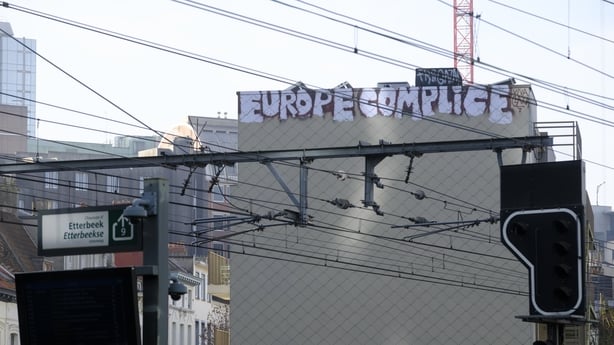
When the Israeli Defence Forces (IDF) attacked UNIFIL peacekeepers in Lebanon, the Czech Republic resisted the inclusion of a condemnation in an official EU communiqué until the last minute (when the foreign minister realised he was in a room with counterparts whose troops were at risk of being killed).
Successive Irish governments have long nurtured greater sympathy - for equally historic reasons - for the Palestinian cause, bolstered - say officials - by a strong commitment to international law and multilateral institutions.
On this occasion, despite a joint diplomatic push with Spain - supported in part by Belgium, Malta and Slovenia - Ireland found itself in a minority when it came to putting more pressure on Israel.
EU-Israel Association Agreement
That process began when then taoiseach Leo Varadkar - supported by Tánaiste Micheál Martin - teamed up with his Spanish counterpart Pedro Sanchez in February last year to ask Ms von der Leyen to review the EU-Israel Association Agreement.
The charge was that Article 2 of the agreement - which covers trade and bilateral relations - binds both sides to human rights and international humanitarian law, and that Israel could be in breach.
Because the agreement covers political and trade aspects, it fell awkwardly in terms of competences: the Commission has exclusive competence for trade, but member states jealously guard foreign policy.
For Ms von der Leyen to accede to the Irish and Spanish demand, the EU's foreign policy chief at the time Josep Borrell would have had to get consensus from foreign ministers.
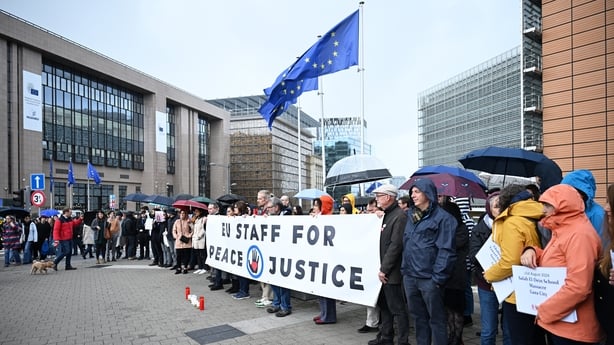
The idea was strongly resisted by Germany, Hungary and the Czech Republic; the Irish and Spanish request essentially languished.
However, Mr Borrell himself was sympathetic.
He asked the EU’s special envoy for human rights Olof Skoog to report back on the reality of the Israeli campaign in Gaza; the former Swedish diplomat presented a paper to foreign ministers in November.
According to extracts, published by the US-based Intercept website, Mr Skoog concluded that "given the high level of civilian casualties and human suffering, allegations focus mainly on how duty bearers, including the Israeli Defence Forces (IDF), have seemingly failed to distinguish between civilians and combatants and to take all feasible precautions to protect civilians and civilian objects against the effects of the attacks, in violation of the fundamental principles of [international humanitarian law]."
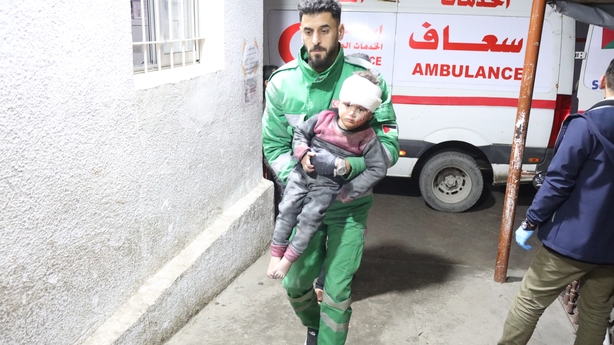
More worryingly, Mr Skoog alleged that "dehumanising language" by Israeli leaders may "contribute to evidence of intent" to commit genocide.
Despite that, there was no consensus at the November meeting on banning arms sales to Israel.
A suggestion by Mr Borrell, that the EU suspend political dialogue with Israel, also got short shrift from a number of capitals.
The move was seen as an attempt by the former Spanish socialist politician to end his mandate with a flourish, and would clearly not achieve the required unanimity.
As the war dragged on, the only thing member states could agree on was the need for a ceasefire and for a massive injection of humanitarian aid.
Harsh rebuke
The EU’s long-standing support for a two-state solution was also a fixture.
Meanwhile, Ireland continued the diplomatic track with Spain in jointly recognising - along with Norway - Palestinian statehood.
This drew a harsh rebuke from Israel and ultimately led to Tel Aviv closing its embassy to Dublin.
However, the initiative was designed to give the Palestinian Authority some badly needed moral support in the face of Israel’s insistence the Authority could have no role in postwar Gaza, and the ambitions of right-wing elements in Benjamin Netanyahu’s cabinet to annex the West Bank.
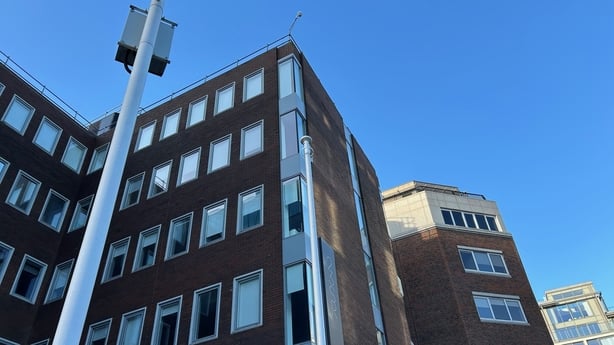
It also was an attempt to support the Arab Peace Initiative, which roughly proposed broad recognition of the State of Israel in return for a Palestinian state with appropriate land swaps.
Since previous peace initiatives placed the two-state solution at the end of the process, it would be better to establish the concept of a Palestinian state at the outset - with, it was hoped, increasing recognition by EU member states - and only then put the building blocks in place.
No other member state joined the gambit; but when former Estonian prime minister Kaja Kallas replaced Mr Borrell in November there was a change in the political atmosphere.
Due to his increasingly outspoken criticisms of Israel, Mr Borrell had become persona non grata in Tel Aviv.
It’s understood the Israelis turned down his request for a visit.
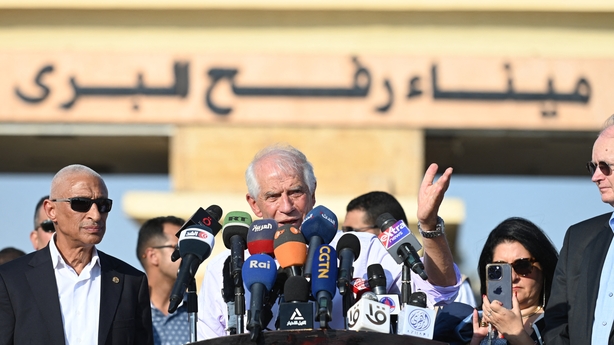
While Israel signalled it was open to a meeting of the EU-Israel Association Council - which was originally designed to bring both sides together annually - it would only be to discuss normal bilateral issues, not the war in Gaza.
In contrast to Mr Borrell’s more antagonistic approach, Ms Kallas had a different style and emphasis, seeking to reset the EU-Israel relationship.
Ms Kallas argued that only by engaging could the EU spell out its views and once Mr Borrell was out of the way, the Israelis changed their position.
Gaza on the agenda
They would be open to having Gaza on the agenda of the meeting, to take place in Brussels on 27 February, but not as the first item.
According to officials, the EU and Tel Aviv then spent weeks on the nature and order of the agenda.
Member states were insisting that Gaza was the first point. Eventually the Israeli side conceded.
Irish officials are thought to be content with the outcome.
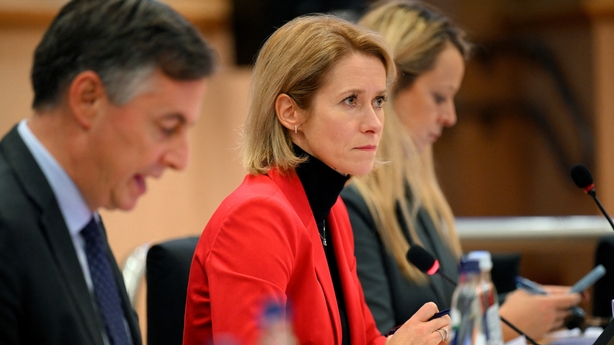
The agenda does not spell out that Article 2 is up for discussion, but once Ms Kallas has delivered her opening statement, each foreign minister will make their interventions, and Ireland will undoubtedly raise its concerns.
The Irish view is that the International Court of Justice’s (ICJ) advisory opinion on the illegality of Israel’s occupation of Palestinian territories means the EU is bound to restrict sales of goods produced on those territories.
While the EU excludes such goods - which are said to be minimal - from its preferential trade arrangements with Israel, selling them into the EU per se is not illegal so long as they are labelled as originating in the Occupied Territories.
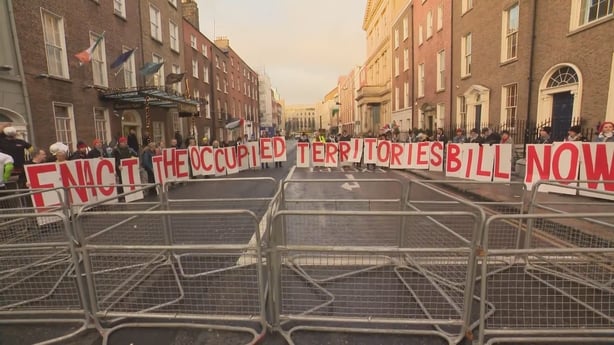
The EU’s legal services have concluded that the bloc is not in breach of the ICJ’s July opinion, according to officials.
That means if Ireland goes ahead and blocks goods through the Occupied Territories Bill it will, in theory, be in breach of the EU’s common commercial policy, which grants the European Commission sole competence in trade matters.
Ireland believes the EU Treaties contain a relevant exemption; the issue will likely end up in the European Court of Justice.
The priority for the EU in the meantime will be to get much more humanitarian assistance into Gaza.
Politics of peace
Next week EU ambassadors will discuss the possibility of reviving the EU border assistance mission to Rafah, known as EUBAM Rafah, which was established in 2005 but has been in abeyance since Hamas took control of Gaza in 2007.
In the longer term, the EU will be involved in the reconstruction of the shattered enclave in conjunction with Gulf Arab states; the politics of a peace process will be much more delicate.
The EU, as well as the G7 and the Gulf states, agrees that the Palestinian Authority (PA) - not Israel, or Hamas - should have a central role in the management of postwar Gaza, something Israel is dead set against.
The PA has been accused of inefficiency and corruption, and it is almost bankrupt. For the first time the EU is linking sizeable amounts of funding to a reform of the body.
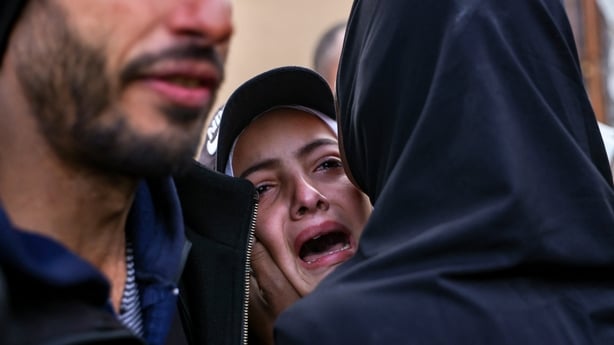
The EU has also been keen to host an international conference on kickstarting a peace process.
But what that will look like, and how Europe can shape it, is hard to discern.
Israel’s ability to destroy or heavily degrade both Hamas and Hezbollah (in Lebanon), and Iran’s loss of influence in post-Assad Syria, suggest that a thoroughly emboldened Israel feels militarily supreme and in charge of a new regional order, one in which there is no need to make concessions to the Palestinians.
Donald Trump has also pledged to expand the Abraham Accords - the sequence of agreements whereby Arab states normalise relations with Israel in exchange for market access and other concessions.
Critics have said that approach has done nothing to advance the cause of Palestinian statehood.
That means caution remains. While there is genuine and widespread relief at EU level at the ceasefire announcement it is clear all sides have a long way to go.






